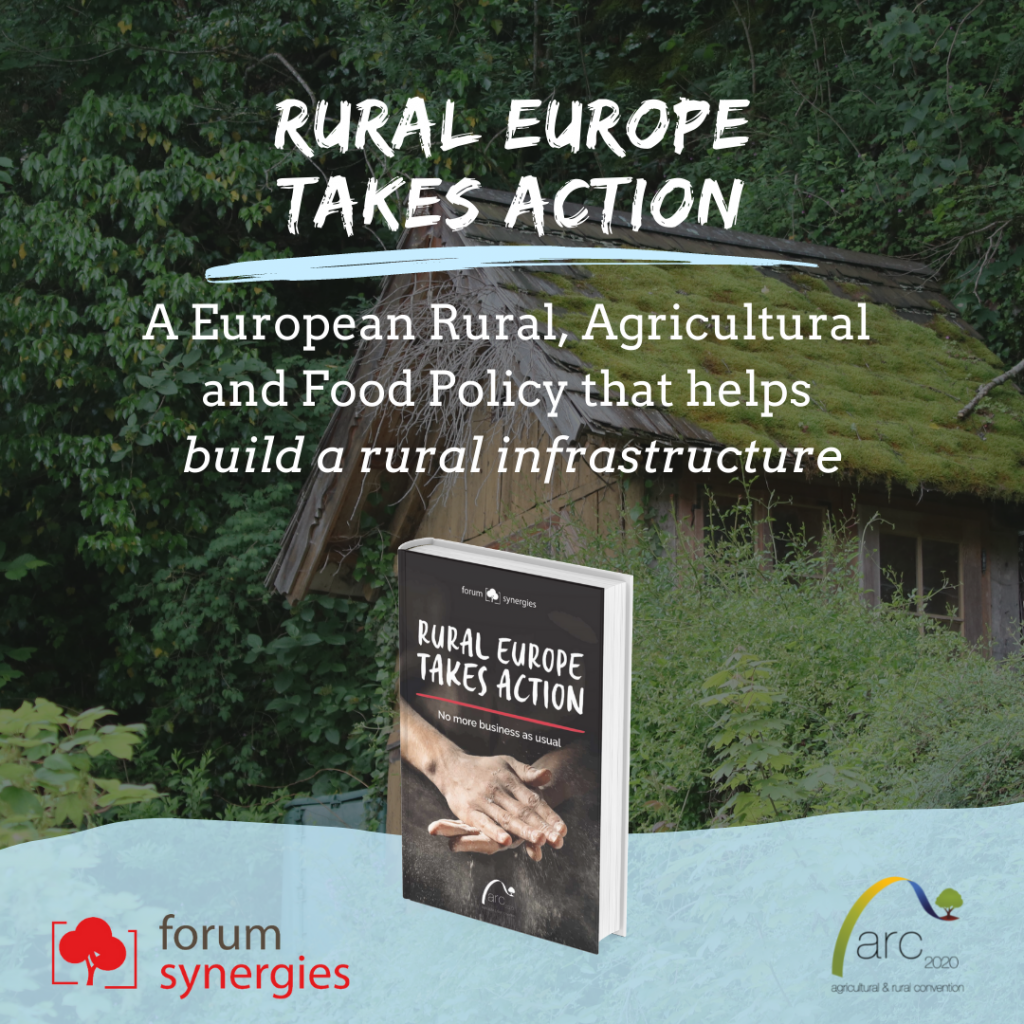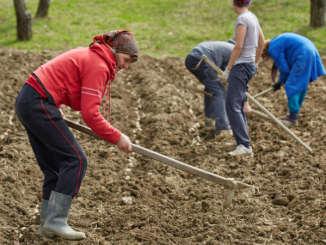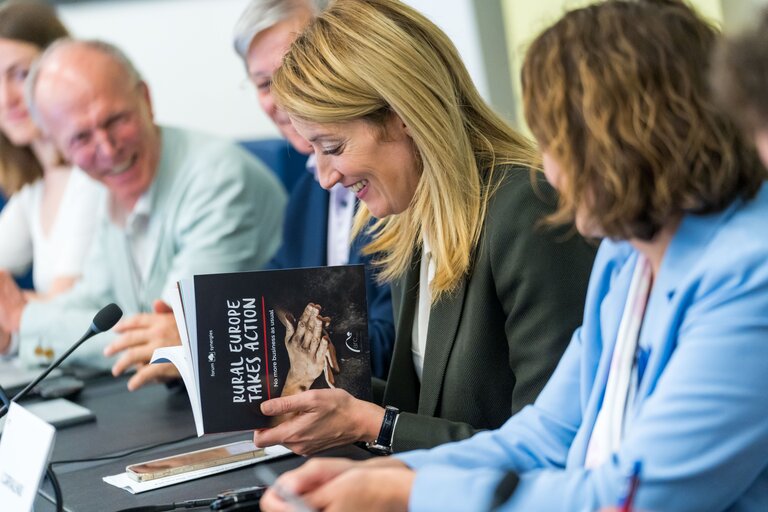
A book filled with “extraordinary examples of ongoing transformations of our rural world” was launched in the European Parliament this week. Key political stakeholders – including European Parliament President Roberta Metsola, Isabel Estrada Carvalhais, and Dacian Ciolos – agreed on the need to start to build a process to explore and develop ideas contained therein – including a radical new Regulation. So what are these ideas? Ashley Parsons and Oliver Moore report.
Key messages
- CAP at 60 needs to plan to retire – ARC2020 and Forum Synergies present a new integrated as-yet-unwritten Regulation for rural, agriculture and farming,
- Regulation flips rule and exception, proposing “organic production and processing or equivalent practices by 2040” as “legal ground” for EU agriculture centring rural and integrating farming and food.
- Regulation centres a rural infrastructure for transition;
- Process of building upon this rurally focused unwritten regulation should start now to prepare for 2028
- EU’s processes – especially for rural in the National CAP Strategic Plans – are weak and need to be radically improved. Future of Europe conclusions of May 9 and the Rural Pact conference on the 15th of June are both promises, not actions. Europe deserves more.
- Rural is the answer to many of the interrelated questions we face. As the bakers show – a new diversified rural infrastructure will be key.
- Key political stakeholders agreed on the need for action, urgency and on the merit of the approaches outlined in the book
- Europe needs to engage with Albania and North Macedonia properly now, for the sake of stability and peace in our dangerous new context. Real accession negotiations need to happen now.
A provocative, optimistic, diverse and action-oriented book has been launched during the plenary session in the European Parliament. Strasbourg, June 7th, was the date for ARC2020 and Forum Synergies to launch Rural Europe Takes Action – No More Business as Usual.
A selected audience of key rural stakeholders and MEPs in Strasbourg and via webex online heard a strong challenge to the EU Institutions to take real action, and to move beyond the words and promises of tepid, weak EU processes such as the Conference on the Future of Europe and the Rural Pact.
Time for Action
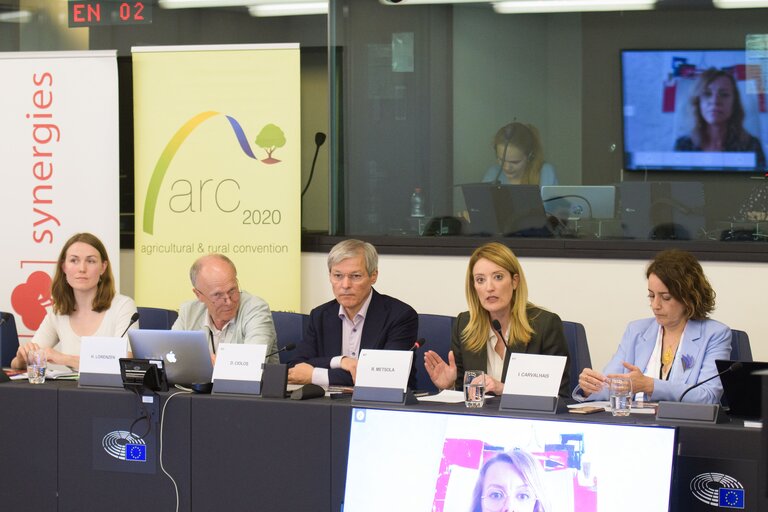
European Parliament President Roberta Metsola welcomed Rural Europe Takes Action, emphasising how enthusiastic she was to be in attendance in a context of Fit for 55 and the CAP’s 60th Birthday celebrations. Recalling her own background as Maltese and Finnish, she saw the importance of centring rural perspectives, while integrating farming, environmental, food security and demographic needs into a coherent perspective.
Importantly, Metsola encouraged Isabel Estrada Carvalhais, AGRI Rapporteur for the own-initiative report on a long-term vision for the EU’s rural areas, to bring the perspectives and strategies presented in Rural Europe Takes Action into her own-initiative report, currently in development. Moreover, Metsola encouraged collaboration and alliance-building in the Parliament to stem from this inclusion, to allow the Parliament to aid the Commission in its policy forming processes..
For her part Carvalhais, who found this book “timely”, filled with “extraordinary examples of ongoing transformations of our rural world” and “innovative paths that may be useful as sources of inspiration.”
Candidly, she acknowledged the shortcomings of current institutional approaches to rural processes such as the Long Term Vision for Rural Areas. This “must develop into a true rural strategy at the EU level to be fully integrated into future programming periods supported by national and regional rural strategies” She emphasised “we must not repeat the mistake of this vision, who’s late publication has precluded its full integration on the current multiannual financial framework. And therefore we need to start working right now.”
The Portuguese MEP added that we must “remove persistent obstacles to the multfund approach to build more integrative approaches for rural areas, in order to improve cohesion between eu and national funding instruments” .
Carvalhais noted that the book presented “concrete ways to help answer difficult questions – precisely the illustration of what we are trying to achieve. It reminds us that rural areas are a geography of dialogue, of interculturality, of human understanding. In times so challenging for democracy and the European project, looking at these examples and actions are inspiring because they show rural areas as a space of effective concretisation of so many of the values that we deem dear in the European Parliament.”
The AGRI Rapporteur, who seemed genuinely enthused by the book, chimed with many of the topics of the book – the complex impacts of digitalisation, which, while important, is “not a panacea”, nor “an end in itself”, but, rather a service for people and their connectivity needs.
The event was hosted by Dacian Ciolos, MEP and Former European Commissioner for Agriculture and Rural Development who welcomed the unwritten regulation, noting how important it is to focus on content as well as money. “What you say – No More Business as Usual – is exactly what we must do,”. The examples in the book of real people and communities taking action now – ahead of the legislative and institutional pace of change show politicians’ ideas that “can be done on a small scale to test them. Distilling these ideas can help to diffuse them on a larger scale, and helps politicians inspire people.”
Katrīna Idū, President of Forum Synergies, and co-moderator of the event, noted that “the era of extreme and destructive competition is over – we have entered a period of cooperation, where the role of youth will be crucial. We need more intergenerational cooperation and transmission of knowledge so that we can build a supportive climate for youth initiatives. We are the future of rural Europe”, she noted.
Lead author of the book and co-author of the unwritten Regulation, Hannes Lorenzen of ARC2020, provocatively suggested “maybe it’s time to think about pre-retirement” for CAP, which has its 60th birthday celebrations earlier in the week, also in the Parliament in Strasbourg.
Noting the dozens of examples from around Europe of people and communities taking real and impactful action, Lorenzen stressed that the book “points to action that is already taken; it is not a message that the EU should do this or that. It’s already being done – we just need a good policy framework where it can grow and develop.The key message stands below the title – no more business as usual”.
Taking the Action
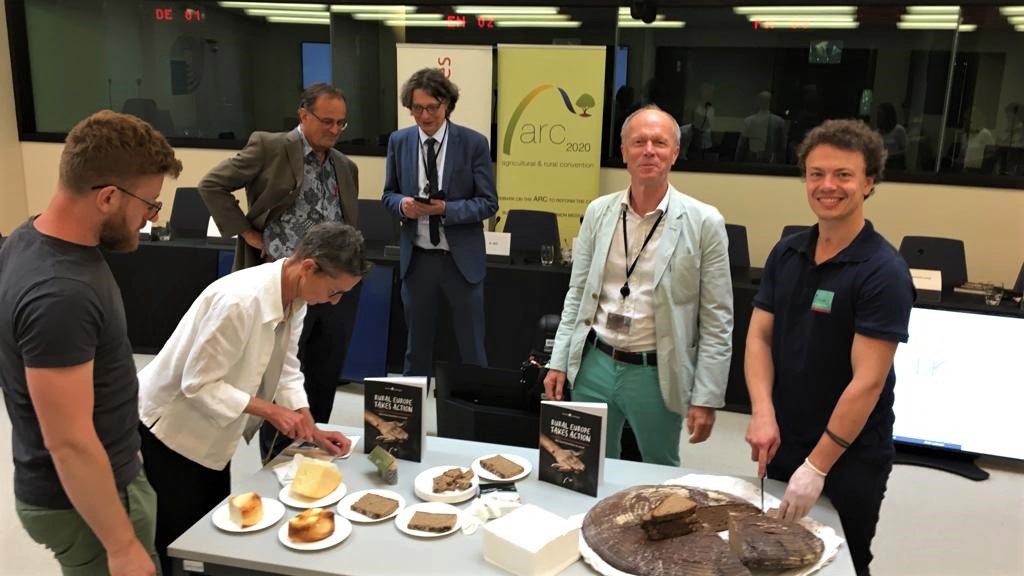
Read the e-book Rural Europe Takes Action – no more business as usual
So who’s taking the action? Mayor of Plessé in Brittany, France, Aurélie Mézière told participants of the innovative approach this village has taken on the ground. Faced with the encroachment of megafarms while village life disintegrated, the Major formed a Committee of elected representatives and committed citizens to develop an Agriculture and Food Policy for the municipality.
Focused on protecting the remaining 90 farms in the municipality via genuinely innovative local engagement tools, while also building a vibrant, transversal agri-food and environmental democratic culture, the Major stressed that “villages should be empowered to roll out complete proposals”.
Anke and Lukas Kähler from the Free Bakers movement in Germany (Die Freien Bäcker) showed how much a committed group of people in such a central part of the food system can do – despite the real obstacles they face. Bakers are at the centre point between farmers and consumers, understanding fair income and fair prices; emphasising adequate infrastructure and laws for playing such a role.
“We’re adapting to the material, not adapting the material to what the industry wants” they said of the ingredients nature provides for bread-making. No “needless acceleration” and all the health and environmental issues that come with that: instead they work with“time, knowledge and skills sharing via networks”. Die Freien Bäcker work with heterogeneous wheat populations and regional organic value chains – “but we need you too” they said, taking aim at the politicians in the room. “The political framework conditions must make the internalisation of ecological and social costs in Euro possible and socially enforceable. The fact that a kilo of industrial produced pork is still sold for 4.5€ and a kilo of sustainably produced whole wheat bread has to cost at least 5€, makes the serious mistakes of our food systems more than clear.”
Boban Ilic, Secretary General of the West Balkan Standing Working Group (SWG) on Agriculture and Rural Development, has been taking real action on the ground – bringing agricultural ministers from this region with such divisions together regularly. However, the North Macedonian European citizen is extremely frustrated standing at the EU’s fence now for 20 years.
Ilic reminded those assembled that the Western Balkans are just as much Europeans as they are, and that they face the same challenges rural citizens face all over the continent – “but three times worse”. Ilic pleaded to open accession negotiations for North Macedonia and Albania as soon as possible, and noted that the Green Agenda for the Western Balkans suggested by the EU is already being implemented on all levels – “we need assistance for this from the EU institutions.”
“Since 2009, every year we get positive reports from the European Commission to start negotiations, they still have not started. I am pleading with those who have the power to start negotiating with North Macedonia and Albania as soon as possible. The disappointment , the long process, means the credibility of even this institution is shaken” he noted.
“We are willing to join, we will do everything in our homework, but you have to do yours too. Otherwise, other powers and parties will play their game. We are Europeans, we belong to Europe.”
After a 14 hour journey, the farmer and former Secretary of State of Romania George Cățean came to the table to recount his experience as a member of the state and as a farmer – he’d prefer the farming life. But only on the condition that the European Parliament takes action “to fight for the solution to continue for young people to be part of agriculture.” He stressed the need for agriculture to become just a facet of rural life: “Rural is not just agriculture. We need to support rural areas to keep and invite young people. Rural [life] is for everyone – urban dwellers, young people, Muslims, Christians, and LGTBQ+” he noted.
Like the Free Bakers, who brought their 5 kg rye bread to the meeting, Cățean shared a great variety of cheeses from his farm at the meeting.
Retirement Plan of the CAP – a New Regulation

The most provocative part of the book and the event was the unwritten Regulation. This integrated rural agricultural and food policy proposal inverts rule and exception, making global organic and equivalent regenerative and resilient standards mandatory by 2040, while centering rural and its socio-economic, infrastructural and value chain needs.
Co-author Robert Lukesch led the assembled on a visionary journey back from the future where this is indeed the case – back from carbon neutrality, back into integrated, cohesive policies which “mesh together like gear wheels”, where policy ensures the wellbeing of systems – spaces and communities – not interest groups.
This is a reversal of the current reality, where organic is certified and inspected and considered the unusual one – indeed being funded primarily as income forgone and costs incurred. How about we put it the other way – organic is the norm and deviations from this are the exception?
Assembled MEPs and commentators alike found it challenging and compelling – “a vision for the future, in the form of a very bold proposal for an unwritten legislation on an integrated European rural agricultural and food policy” as MEP Carvalhais put it. “I think there is merit in being ambitious about what we propose. It is indeed time to start reflecting on the next programming period, and to start creating a different context for rural territories, one that secures prosperity and well being for the communities.”
Carvalhais found it reaffirms what she felt reading the book; and provided “concrete ways to answer difficult questions – precisely the illustration of what we are trying to achieve”.
Looking at the finer details to unfurling of the unwritten Regulation, Marcos Lana of Agroecology Europe focused in on the concept of transition presented in the unwritten regulation. “We need to help the farmers that are conventional on this transition. We show a lot of nice examples of farmers that are already working in a sustainable and profitable way, but what about the ones that are on the treadmill and want to get out?” Noting biophysical differences across the EU, calls for a public advisory service to stick to agroecology principles to guide farmers and rural citizens in their transition.
A transition yes, but one that is inclusive and promotes equity. Caroline Whyte, of FEASTA (the Foundation for the Economics of Sustainability) appreciated the rebalancing of the economy the Regulation would represent, and that the unwritten regulation focuses “on empowering all rural actors to contribute to the well being of society as a whole and of rural communities in particular.” Removing a the David and Goliath disparity between citizens and megacorporations: “We can’t really rely on markets alone or even an improved payment system,” to address issues like the “thresholds and bands for active chemical substances that are produced in the EU, and production restrictions concerning nature, conservation of different kinds, or making of organic agriculture our default.” A clear plan of action to help farmers and rural people get, “what they deserve in terms of the work that they’re doing,” must happen now, and policy makers must help level the playing field.
Ginaluca Bouroni welcomed the way this Regulation attempts to grapple with complexity and trade offs, and its radical emphasis on labour not land – where land based payments are indexed by a labour factor. Moreover, the focus on investments and innovation as related specifically to cooperation he saw as a positive. He added however that different parts of Europe have different perspectives, histories and approaches to cooperation – “cooperation patterns must work everywhere, including in the east, where both enterprise and integration must be supported” he noted.
“This is something that could revolutionise the farming system for the better regarding population degradation and fragility in rural areas” which are “to a certain extent related to a model of agriculture that fosters both land abandonment or land concentration.” There should be forecast and impact analysis on this unwritten Regulation, the Italian added.
Dacian Ciolos welcomed how the unwritten Regulation brings agriculture, place/nature and revenue streams together – for both farmers and rural people: “put these elements on table, be ready with new vision for next parliamentary elections”.
A fruitful conversation emerged on the balance between world organic standards and agroecological principles. Concerns over input substitution need to be balanced with the decades of work build up, which provides a solid foundation for an organic system that operates legally and globally. Moreover it could raise standards everywhere, as countries trade with the EU.
Next Steps

And this is how it should be – animated conversations about a more integrated policy sphere, inspired by real practices on the ground. More to be found in the book itself Rural Europe Takes Action – No More Business As Usual which is available to read online at this link. Along with scalable, transferable and actionable stories from across rural Europe, starting on page 162 is the Integrated European Rural, Agricultural, and Food Policy (ERAP), an unwritten regulation that we offer to the EU Institutions as they consider what to do with the next CAP, and to member states to use to adapt their strategic plans before the next programming period. Check Forum Synergies for paperback ordering info (or email info@forum-synergies.eu) , Watch out for contributions at the European Rural Parliament, on the ARC2020.eu website, sign up for the weekly or monthly newsletter and bespoke events coming up soon.
Read the e-book Rural Europe Takes Action – no more business as usual
More
Rural Europe Takes Action | For Resilience and Peace – Political Action Now!
https://www.arc2020.eu/rural-europe-takes-action-book-launch-and-draft-eu-regulation/

